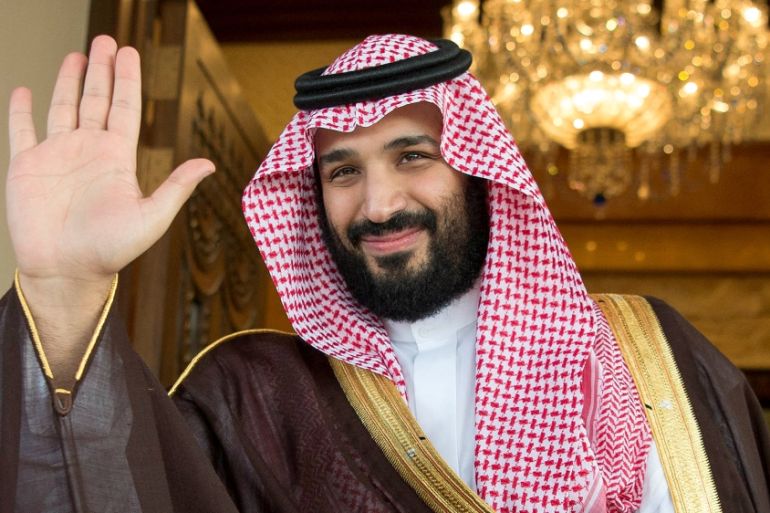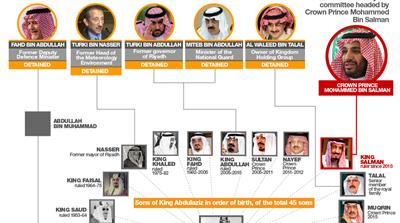Bin Salman and the end of Saudi’s consensus rule
Analysts and ex-US intelligence operatives warn of regional instability in wake of crown prince’s power consolidation.

Saudi Arabia’s Crown Prince Mohammed bin Salman is risking political and regional instability by dismantling a decades-old system of consensus rule, analysts, including ex-top US intelligence officers, have told Al Jazeera.
Since replacing his cousin Mohammed bin Nayef in June as first in line to succeed King Salman bin Abdulaziz Al Saud, the 32-year-old has embarked on a campaign to consolidate power, taking on rivals within the Saudi royal family and religious activists.
In September, Saudi police arrested dozens of religious figures, including Islamic preachers Salman al-Awdah and Awad al-Qarni, who remain behind bars.
However, the heir to the throne’s most ambitious move came late on Saturday when he fired senior ministers and had dozens of the country’s richest men detained, ostensibly on the grounds of combatting corruption.
They included his cousin and one of the world’s richest men, Alwaleed bin Talal; at least 11 other princes; four ministers; and several more ex-ministers.
|
|
Waleed al-Ibrahim, chairman of the Middle East Broadcasting Center (MBC), one of the region’s largest media companies, and construction magnate, Bakr Binladin of the Saudi Binladin group, were also detained.
Confusion also surrounds the whereabouts of Mohammed bin Salman’s predecessor as crown prince, Mohammed bin Nayef, who has not been seen publicly since June and is rumoured to be under house arrest.
‘One-man regime’
The targeting of Saudi Arabia’s long-standing elite represents a shift from family rule to a more authoritarian style of governance based around one man, according to Durham University academic Christopher Davidson.
“Going after such ‘big fish’ is intended by MBS and his allies in Abu Dhabi as a signal of MBS’ newly-established sultanistic powers,” he said, using the widely-used acronym for Mohammed bin Salman and referring to his close ties to the leaders of the United Arab Emirates.
“By going after the richest, whether fellow princes or media moguls and construction magnates, MBS is demonstrating that nobody is outside his control, as he is now at the top of a more authoritarian, ‘one-man regime’, with the old consensus-based, dynastic monarchy of the past century having effectively collapsed at some point earlier this year.”
Analysts said this week’s purge by Mohammed bin Salman could potentially alienate members of the wider Al Saud family at a time when the country struggles to balance its finances amid sustained low oil prices.
Bruce Riedel, a 30-year CIA veteran and director of the Brookings Intelligence Project, shared some of Davidson’s assessment, describing the mass arrests as “unprecedented”.
“Royal family politics are traditionally consensual with great emphasis on preserving decorum and honour, even for failed ministers,” he said, predicting that the breaking of the traditional Saudi consensus-based model of rule would lead to disorder within the country.
“There will be much discontent behind the scenes in the family, and the Kingdom is headed for instability.”
‘Perfect storm’
The breakdown of consensus rule could have wider implications both at home and abroad, particularly in terms of the Saudi relationship with its regional rival, Iran, according to former US intelligence operatives.
Since Mohammed bin Salman’s elevation to defence minister and deputy crown prince in 2015, and later to crown prince, Riyadh has taken on a more aggressive foreign policy stance towards Tehran.
In March 2015, Saudi Arabia went to war against Houthi rebels in Yemen, believed to be backed by Iran. In early 2016, it announced the severing of diplomatic ties with Iran.
Amid rising regional tensions, Mohammed bin Salman on Tuesday accused Iran of what could be “considered an act of war”, blaming Tehran for supplying the Houthi group with a missile that was fired towards Riyadh but was intercepted by Saudi air defence forces.
Iran has rejected the Saudi accusation as “malicious, irresponsible, destructive and provocative”.

Domestically, the crown prince has promised a raft of social and economic reforms, including a partial public share offering in Aramco, the state-owned oil company, and the end to a ban on women driving in the kingdom.
He also launched Vision 2030, a reform plan seeking to reduce the reliance of Saudi Arabia’s economy on oil and instead develop the country’s tourism, health and education sectors.
Robert Richer, former associate deputy director of operations of the CIA, told Al Jazeera the events of the past week marked a significant break with the traditional methods of decision making in the country.
|
|
While praising the crown prince’s plan for modernisation, Richer, who was stationed in a number of Middle Eastern countries, said Mohammed bin Salman’s rise could contribute to an increased possibility of war with Iran, which he called “worrisome”.
Having consolidated power, and without moderating influences around him to temper Saudi foreign policy, the young prince could look to settle old scores with Iran once and for all, he argued.
“This is the perfect storm for [Mohammed] bin Salman, where you have Saudi Arabia, the US and Israel, which view Iran as the greatest threat in the region,” said Richer.
US President Donald Trump, who praised Mohammed bin Salman and his father in the wake of the recent wave of detentions, has repeatedly accused Iran of “supporting terrorism and exporting violence, bloodshed and chaos across the Middle East”.
‘World needs stable Saudi Arabia’
Tensions between Iran and Saudi Arabia have existed for decades, dating back to the 1979 Iranian revolution, which turned the former into an Islamic republic.
Saudi Arabia and other Arab states have accused the Iranians of wanting to overthrow their governments and export the revolution since.
Former CIA officer Bob Baer credited the Saudi royal family’s consensus-based approach to rule for preventing a war with Iran up until now, warning Mohammed bin Salman’s purge made the country’s future stability less certain.
“The Al Saud [ruling family of Saudi Arabia] have survived all these years, thanks to a remarkable and unbreakable consensus among their ranks and has avoided war with Iran,” said Baer.
“No one wants to see a war in the region especially given that Iran is not a small country, is an economic power, has its own clear identity and has the support of its population,” he added.
“The world needs a stable and predictable Saudi Arabia.”
Follow Ali Younes @Ali_reports and Shafik Mandhai @ShafikFM on Twitter